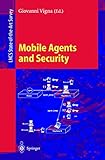Mobile Agents and Security [electronic resource] /
Material type: TextSeries: Lecture Notes in Computer Science ; 1419Publisher: Berlin, Heidelberg : Springer Berlin Heidelberg : Imprint: Springer, 1998Edition: 1st ed. 1998Description: XII, 257 p. 8 illus. online resourceContent type:
TextSeries: Lecture Notes in Computer Science ; 1419Publisher: Berlin, Heidelberg : Springer Berlin Heidelberg : Imprint: Springer, 1998Edition: 1st ed. 1998Description: XII, 257 p. 8 illus. online resourceContent type: - text
- computer
- online resource
- 9783540686712
- 005.824 23
- QA268
Foundations -- Security Issues in Mobile Code Systems -- Environmental Key Generation Towards Clueless Agents -- Language Issues in Mobile Program Security -- Protecting Mobile Agents Against Malicious Hosts -- Security Mechanisms -- Safe, Untrusted Agents Using Proof-Carrying Code -- Time Limited Blackbox Security: Protecting Mobile Agents From Malicious Hosts -- Authentication for Mobile Agents -- Cryptographic Traces for Mobile Agents -- Mobile Code Systems -- D’Agents: Security in a Multiple-Language, Mobile-Agent System -- A Security Model for Aglets -- Signing, Sealing, and Guarding Java™ Objects -- Active Content and Security -- The Safe-Tcl Security Model -- Web Browsers and Security.
New paradigms can popularize old technologies. A new \standalone" paradigm, the electronic desktop, popularized the personal computer. A new \connected" paradigm, the web browser, popularized the Internet. Another new paradigm, the mobile agent, may further popularize the Internet by giving people greater access to it with less eort. MobileAgentParadigm The mobile agent paradigm integrates a network of computers in a novel way designed to simplify the development of network applications. To an application developer the computers appear to form an electronic world of places occupied by agents. Each agent or place in the electronic world has the authority of an individual or an organization in the physical world. The authority can be established, for example, cryptographically. A mobile agent can travel from one place to another subject to the des- nation place’s approval. The source and destination places can be in the same computer or in di erent computers. In either case,the agentinitiates the trip by executing a \go" instruction which takes as an argument the name or address of the destination place. The next instruction in the agent’s program is executed in the destination place, rather than in the source place. Thus, in a sense, the mobile agent paradigm reduces networking to a program instruction. A mobile agent can interact programmatically with the places it visits and, if the other agents approve, with the other agents it encounters in those places.


There are no comments on this title.